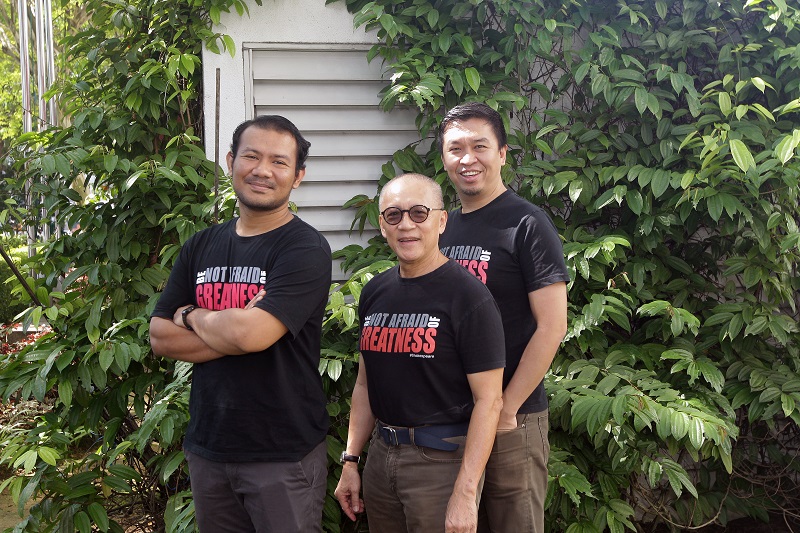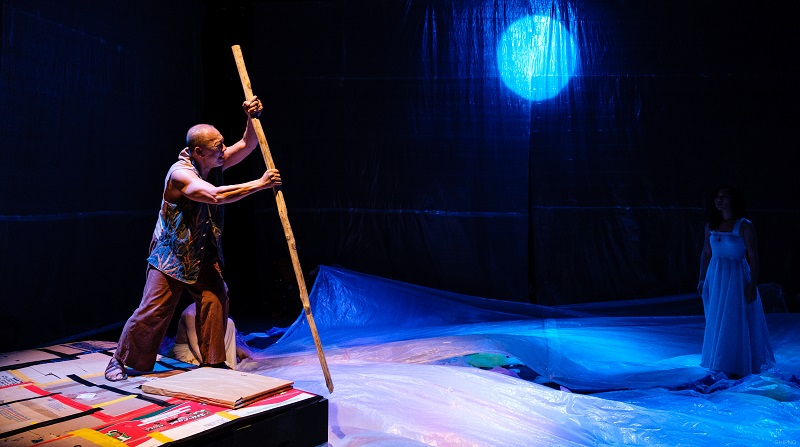
The Tempest is a rather overlooked dramatic fantasy that is set on a remote island where a sorcerer, Prospero, lives with his daughter Miranda and two servants (Photo: DPAC)
In March, when the KL Shakespeare Players (KLSP) staged its latest show, one thing in particular stood out from past productions. It was not one of the company’s well-known “Demystified” works, which provide narration in contemporary English to help weave scenes together and clarify Shakespearean expressions.
In fact, a name attached to the production piqued our curiosity — David Glass. The American-born, UK-based theatre maker, known as a pioneer of physical and visual theatre, has worked with some of the biggest names on stage and on the silver screen, actresses such as Emma Thompson and Gong Li for instance.
He was here in Kuala Lumpur to conduct several workshops and connected with KLSP founders Lim Kien Lee and Lim Soon Heng. They discussed a collaboration and Glass was keen, except not in staging a Shakespeare play.
“KL Shakespeare Players has always been very text-faithful, whereas David Glass is very much about devised plays. But we wanted to try it, to see what it would be like to be directed by him,” says Kien Lee.
“He chose The Tempest because he did not want to do the same old Shakespeare that has been done by so many people. He chose it because this is the only play that allowed for magic,” Soon Heng chimes in.
peo_group_hh.jpg

The duo, alongside KLSP production manager Zul Zamir, sat down with Options to talk about the show, their experience of working with Glass and why they are restaging it this week.
On choosing the last of Shakespeare’s works — a rather overlooked dramatic fantasy that is set on a remote island where a sorcerer, Prospero, lives with his daughter Miranda and two servants, the monstrous Caliban and Ariel, the airy spirit — Glass saw an opportunity to take more creative licence in reimagining the characters and story.
“It is based on Shakespeare, but it is not actually Shakespeare’s version of The Tempest,” says Kien Lee. Instead, Glass creates an original story loosely based on the characters and overall frame of the 17th century play with an entirely new script.
“He extracted key themes that he himself is inclined towards, such as environmental issues, global warming, how politics play out in different countries and the abuse of power,” says Kien Lee, who plays Antonio, Prospero’s antagonistic brother.
Soon Heng, who plays Prospero, adds, “The power here is centred on Prospero. There is nothing he cannot do, so there is not really a conflict in the story of The Tempest, rather, it is about how he brings in these people to punish them and yet, in the end, how he forgives them. So, it is also about confronting power and how one uses it.”
“And within all that chaos, the pillar and foundation of it all is the family,” points out Zul, who also acts as Sebastian and the captain of the ship. He notes that one key difference in Glass’ interpretation is his focus on Miranda, telling the story from her perspective. “Within the old Shakespeare plays, the focus is always male-centric, here, the one female character has been played up.
3csp6181.jpg

“What we have learnt is that younger audiences who watched it were engaged and interested. Because of this examination of the coming-of-age psyche, that teenage phase, where Miranda’s exposure to new influences — people coming to the island — affects her.”
The refreshingly visual style of the staging has also been a draw, adds Zul. The performance theatre piece also places a strong focus on music, using it throughout and in tandem with the storytelling.
“It is a little bit cinematic,” Soon Heng says. Kien Lee nods, saying that Glass turned what was a tragicomedy to a melodrama, with a dystopian and dark tone, “He likes to play with light and darkness, like a chiaroscuro.” A view of the show’s trailer confirms this, with a play on shadows and light effects to evoke suspense, drama and even the ocean.
“If someone were to ask me to describe David Glass’s Tempest, I would say it is film on stage. You have your dissolves, you have your fast cuts and jump cuts,” Soon Heng continues.
All three echo that the creative process was an immersive, often chaotic experience. “Speaking of film, Glass would even get us to try different angles on stage, as if the audience is viewing it from the point of view of a camera in a film. Watching the sea from the front, or from the top, which meant we had to lie down,” laughs Kien Lee. “His philosophy is that you never say no to an idea, he won’t think about how it would work on stage, but would ask us to just try it.”
But that is how moments of ingenuity emerge, and what makes the director renowned for bringing out fresh perspectives and the best in his actors. Soon Heng explains, “One day, he asked us to get him a lot of large plastic bottles filled with water, to be strung up on top of the stage to create a sound effect. How do you expect us to do that within the hour? So we only managed to get him some plastic bags filled with water. And still, he managed to use them. We watched him transform the flat floor of the studio into this magical world, as he got us to place the water bags around and move among them. Just like that, a scene emerges.
The experience has certainly influenced KLSP’s approach to its projects. “We are using more music now,” says Soon Heng, who adds that the company will be staging another physical theatre piece, Old Lear, alongside Butoh dance exponents as part of the upcoming 12th KL Butoh Fest.
But for now, there is David Glass’s Tempest. “When we last performed it, many missed it as it was sold out. We also lost some of our school crowds because of the school holidays then. Moreover, we usually tour our productions in schools after the initial theatre staging, but obviously, this one is a little harder to take into schools without the right facilities,” says Kien Lee. Better not miss this then.
'David Glass’s Tempest' will show until Nov 10 at the Black Box, Damansara Performing Arts Centre, Empire Damansara, Damansara Perdana. Tickets are priced at RM55. Book here.
This article first appeared on Nov 4, 2019 in The Edge Malaysia.


